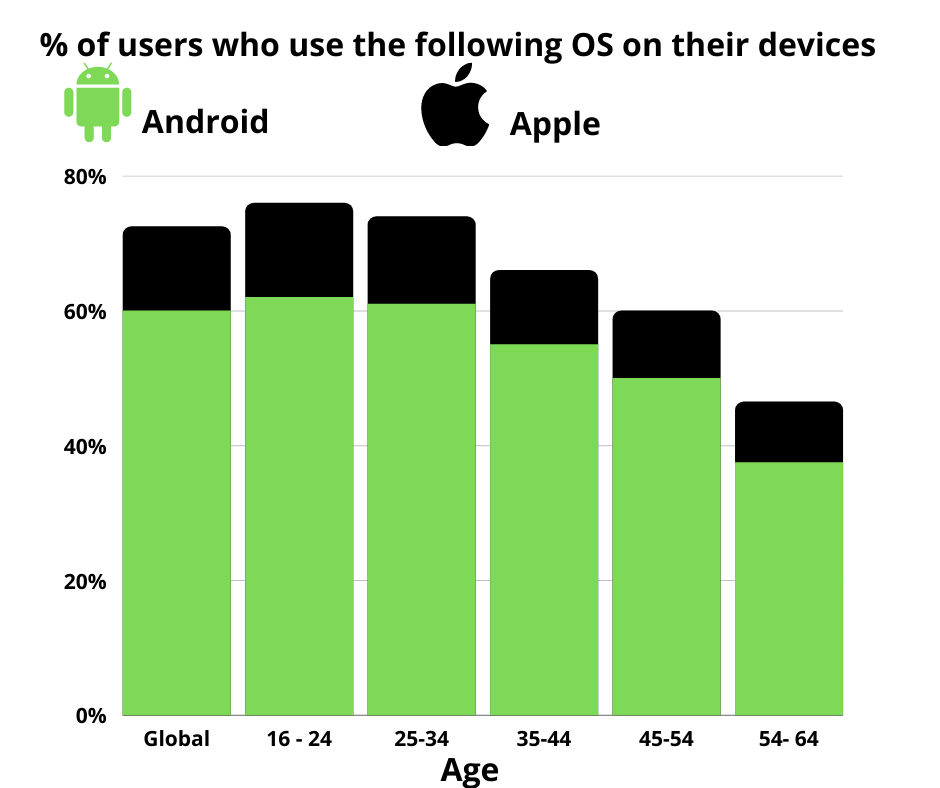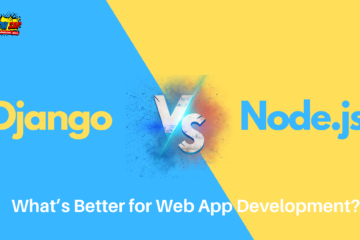Before developing your dream app it is crucial for you to figure if you want to for an iOS app or an Android app. Your decision will naturally depend on a number of factors, including demographics, the target market, development time, etc.
According to research, iOS holds 29.92% of the market share, while Android dominates the market with 68% share. However, iOS generates more revenue than Android. In 2019, the App Store generated $25.5 billion in revenue, while Google Play Store generated $14.2 billion.

Let’s understand the difference between both platforms and compare which OS is the best choice for your business.
Development Process of an iOS mobile app
An iOS mobile app uses a closed source code, and iOS only functions on Apple products. Moreover, development languages used are Objective-C and Swift.
Additionally, iOS development tools comprise of Xcode as the integrated development environment (IDE) and the iOS software development kit (SDK) for delivering UI command, graphics, among other elements.
Not only that, the development environment for Swift is Swift Playgrounds. TestFlight authorizes you to test your applications and gather significant input before the app launches on the App Store.
Advantages of iOS Mobile App Development
1. Higher Revenue:
According to Sensor Tower, the App Store generated 65% more revenue than Google Play in 2019 (as shown in the bar graph below). This is due to the Apple user’s purchase behavior. Research shows that Apple users spend 20% more on app purchases than Android users. Additionally, Apple relies on premium in-app purchases to generate revenue while the Google Play Store mainly relies on the freemium model. Note that the Google Play Store does not include China since it is blocked in China.

2. Enhanced Data Security:
Data security seems to be an issue in Android apps, and several data breach cases have been reported in the past. Comparatively, iOS apps tend to be safer due to strict security procedures. Apple integrates measures to avoid data duplication through data encryption. Additionally, Apple also maintains data privacy by storing all user data in the cloud.
3. Detailed UI designs:
Apple offers in-depth UI and UX design guidelines for its apps, which helps speed up development. In addition, it has the best user experience since its users are already accustomed to the integration of their app on all their Apple devices.
4. Lower Development time
Since iOS apps do not have to be tested across various devices, they take 28% less time to develop when compared to Android apps. Android apps have an extensive development cycle since it requires testing on different devices.
Disadvantages of iOS mobile app development
1. App rejections:
Understand that since the App Store requires you to comply with extensive app release guidelines, there are many reasons your app can get rejected. It could be due to low app performance, security reasons, or insufficient valuable app content. Moreover, app release could generally take a couple of days since it requires the developer to submit real-life testing for your app.
2. Reduced Flexibility:
It can be difficult to customize an iOS app due to the platform’s various restrictions.
The development process of an Android mobile app.
Developers usually use Kotlin, C++, and Java as programming languages for an Android app. Additional development tools include Firebase, Android Jetpack, Android SDK, and Android Studio.
Advantages of Android mobile app development
1. Increased flexibility:
Since Android apps have an open-source Android SDK, they have added features due to the Google Play Store’s features flexibility. Comparatively, iOS apps have various restrictions linked to their app features.
2. Easy Integration:
If you are looking for extensive customization along with web app incorporation, then Android is your solution! Android apps allow easy customization, so you can tweak your mobile app just how you want it.
3. Quick App Release:
Unlike Apple, the app release process for Android is pretty straightforward and quick. It only takes a few hours, making it easy to launch apps on the Play Store.
Disadvantages of Android mobile app development
1. Longer Testing:
Since Android devices and versions can vary greatly, Quality Assurance experts may need more time to examine your app.
2. Costly development:
An Android app may have a costly developmental process in case it has extensive app features and is complicated.
3. Security problems:
Android apps are also more prone to various malware and hacking issues than iOS. This is due to its open-source code. Moreover, while Google releases security patches regularly, many users don’t upgrade.
4. Copyright claims:
As stated earlier, Android has a quick app release process compared to Apple and thus, makes it easy for you to release your minimum viable product (MVP). This is because Android doesn’t conduct extensive copyright checks. As a result, it is possible for you to unknowingly deploy copyrighted content and open yourself up to claims from concerned third parties.
iOS Vs Android App Development
In order to understand your audience better, it is essential to do a comparative analysis of the two mobile platforms.
Demographics
According to research, Android holds a greater platform share worldwide, mainly in developing and underdeveloped countries, including Asia, Africa, and Latin America. Conversely, iOS users are clustered in developed nations like Australia, North America, and Western Europe.

Additionally, iOS users have a higher educational level and tend to be younger. They are financially strong and have high engagement with iOS apps. Apple has deeper market penetration, and its users are, therefore, likely to spend money on their apps. Moreover, iOS users are likely to be in a professional field. On the contrary, Android users are usually part of the tech industry.

Audience
As an entrepreneur or a business owner, your main goal will be to target a mass audience to generate more revenue. Android has a mass audience, while iOS users may be few but are highly engaged.
Development Expenses
Android development can be pricey since its OS has various devices with contrasting display sizes and specifications. This, in turn, increases the expenses along with the development time.
Furthermore, to publish your app on Google Play Store, you need to pay a one-time publishing fee of $25. On the contrary, the development process on iOS is quicker due to limited Apple devices. Additionally, the Apple App Store charges you $99 annually as a publishing fee.
A basic app (iOS, Android) with minimal features may cost around $15k and take around three months to develop. A moderately complex app with external integrations may cost an estimate of $30k and could take up to three months. Finally, a complex app with a database and extensive features may cost $50k and take five months to complete.
App Updates
Updates are essential for keeping your app in good shape and your customers satisfied. An update for your iOS app could take around two weeks, while an Android app release may only take a few hours. Thus, plan your business strategy and product release effectively, keeping in mind the time taken for both OS.
App Testing
There are different simulators for both iOS and Android. The iOS testing simulator, TestFlight, is faster than Android’s emulator. However, Android’s emulator has practical representation and is thus, more functional.
The table below is summarizes differences between iOS and Android development.

If you are a startup with limited capital, then you should perhaps consider first developing for iOS as the development costs are lower. Moreover, it has better PR, and your app will get more clicks on the App Store as opposed to the Google Play Store. Furthermore, an iOS app is beneficial for generating high revenue, has a simpler development cycle, and a great choice if you value data privacy and security above all else.
Contrarily, if you want to target an audience from the developing world, then you should likely invest in Android app development. An Android app would be better suited for targeting mass audiences and offer more customizability as well.
Regardless of your approach, it all begins with hiring the right people for the job. Our team at App Wow Zap has years of experience in web and mobile development.
Learn how we can help you bring your dream app to life by scheduling a FREE consultation today.



0 Comments